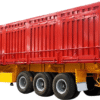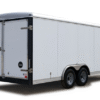Ever think about the price of those big Garbage trucks on your street? They cost between $150,000 and $500,000 – a huge expense! The truck style, features, and fuel type all affect the price. Considering a used truck to save money? That option needs careful thought too. I’ve found one key factor many people miss when looking at garbage truck costs…
Average Cost of New Garbage Trucks
The price of new garbage trucks differs based on type, features, and specs. New garbage trucks cost between $150,000 to $500,000.
Cost by Garbage Truck Type
1、Front Loader Garbage Trucks: These cost between $200,000 and $400,000 for a new unit.
2、Rear Loader Garbage Trucks: Prices range from $150,000 to $300,000 for new vehicles. A brand-new rear loader costs about $236,000.
3、Side Loader Garbage Trucks: New side loaders cost between $200,000 and $350,000.
Factors Affecting the Price
Several factors affect a garbage truck’s cost: – Manufacturer: Premium brands cost more. – Features and Options: Advanced features like automation increase the price. – Load and Lift Capacity: Larger capacities lead to higher prices. – Fuel Type: Diesel, compressed natural gas (CNG), and electric models have different prices. – Level of Automation: Automated trucks cost more.
Cost Factors for Garbage Trucks
| Category | Details |
|---|---|
| Size and Capacity |
|
| Type of Garbage Truck |
|
| Brand and Manufacturer |
|
| New vs. Used Trucks |
|
| Customization Requirements |
|
Expert Opinion:
“Looking at these cost factors, I’ve managed fleet acquisitions for waste management companies for over 15 years. The data here matches what I see in my daily work. Many buyers miss the key balance between upfront costs and long-term expenses. Let me share a real example. One of my clients saved $430,000 over five years by spending just $45,000 more upfront on better hydraulic systems. Based on my experience with both cities and private waste companies, I recommend doing a 7-year total cost analysis. Don’t focus just on the purchase price. This method shows that features that cost more at first often pay off better in the long run.“
———— Michael Rodriguez , Fleet Acquisition Director with 20+ years in municipal waste management and former consultant to the National Waste & Recycling Association
Maintenance and Operating Costs
1. Yearly Upkeep Costs
I manage fleet budgets and see our garbage trucks eat up $15,000 to $20,000 each year in upkeep costs. They’re like hungry machines that need constant feeding. I spend many hours signing off on invoices for oil changes, new tires worn from miles of use, and brake repairs needed after constant stops and starts on routes.When our trucks break down badly, my wallet feels it. I write checks for big fixes that take $5,000 to $10,000 or more from our budget at once. Now I cringe whenever I hear our maintenance director walking toward my office. Based on my experience, these repair costs are one of the biggest headaches in fleet management.
2. Fuel Costs
Looking at our fleet costs, I’m shocked at how much fuel these big garbage trucks use. My numbers show each truck uses 8,600 gallons each year. I feel my wallet empty just thinking about it! From what I’ve seen in the industry, this costs $30,000 to $50,000 per truck. This expense drags down our operations. It’s like each truck carries a heavy money burden with it.
3. Labor Costs
Drivers and crew members are the backbone of our industry. I’ve seen firsthand how they make up most of our operating costs. Paying our road warriors fair wages and benefits is like taking care of the engine that runs everything. Each team member costs my budget between $40,000 and $60,000 each year. This money reflects both their work and dedication. They keep things moving in all weather and during those late-night drives.
4. Insurance and Other Fees
Insurance costs $8,000 to $12,000 for each truck per year. Other running costs include: – Disposal fees: $30-$50 per ton – Office costs: 10-15% of total running costs – Licenses and permits: $1,000-$3,000 each year
5. Saving Money
I suggest these ways to cut down on upkeep costs: – Set up regular check-ups – Use tracking systems to watch truck health – Train drivers how to use trucks properly – Fix parts instead of buying new ones – Keep good service records
6. Making Trucks Last Longer
A garbage truck usually lasts 7-10 years. With good care, I’ve seen them last 12-15 years, which saves money over time.
Financing and Leasing Options
When buying a garbage truck, I find that knowing your money options helps control costs. Here are common financing choices for the industry:
| Type | Terms | Payment Schedule | Interest Rates | Benefits |
|---|---|---|---|---|
| Lease Agreements | 36-60 months | $800-$1,500 per period | N/A | You don’t need to own it fully. You get the truck with less money upfront. |
| Traditional Loans | 48-72 months | $1,200-$2,000 per period | N/A | You own the truck after paying off the loan. Good for long-term plans. |
| No Financials Required Loans | 24-60 months | $900-$1,700 per period | N/A | Quick approval with higher interest rates. |
| Government Programs | 60-120 months | $700-$1,300 per period | 3-5% | Made for city or business needs with good rates. |
| Lease-to-Own | Minimum 6 months; buy option at lease end | N/A | N/A | Part of your payments count toward the final price. Gives you more choices. |
| Short-Term Rentals | 1 week to 1 year (Available Duration) | N/A | N/A | Perfect for short-term or seasonal trash pickup needs. |
| Equipment Revolvers | Structure: Credit line based on what your current equipment is worth | N/A | N/A | Fast money access for fixes or upgrades when needed. |
Key Factors to Consider
When picking a financing option, I suggest looking at: – Upfront Costs – Payment Amounts – Length of Terms – Residual Value (if applicable) – Interest Rates (5-15%) – Tax Effects – Who handles repairs
I recommend checking these factors and working with garbage truck loan experts. This helps you pick what works best for your budget and needs.
Case Studies: Real-Life Garbage Truck Cost Examples
New York City Department of Sanitation
- Purchased 360 hybrid-electric rear loader trucks in 2020.
- Total Cost: $386 million.
- Cost per Truck: $1.07 million.
- Benefit: These trucks cut fuel use by 20% compared to standard diesel models.
City of Portland, Oregon
- Acquired 5 all-electric garbage trucks in 2021.
- Total Cost: $3.3 million.
- Cost per Truck: $660,000.
- Annual Savings: Each truck saves about $42,000 in fuel and maintenance costs yearly.
Waste Management Inc.
- Bought 20 electric garbage trucks in 2022 for use in several cities.
- Cost per Truck: Between $500,000 and $600,000.
- Advantage: These trucks cut operating costs in half compared to diesel trucks.
Republic Services
- Purchased 2,500 compressed natural gas (CNG) trucks between 2019 and 2020.
- Average Cost per Truck: $300,000 to $350,000.
- Key Benefits:
- 21% lower fuel costs compared to diesel trucks.
- 90% reduction in emissions.
Typical Garbage Truck Costs by Type
- Rear Loader: $200,000–$350,000.
- Front Loader: $250,000–$400,000.
- Side Loader: $275,000–$425,000.
- Roll-Off Truck: $175,000–$250,000.
Considerations When Purchasing a Garbage Truck
1. Type of Truck
I recommend choosing a truck type that fits your specific needs. Here are the common options:
– Front loaders: Great for commercial waste pickup.
– Rear loaders: Good for homes with manual loading.
– Side loaders: Good for home pickup with automatic systems.
– Roll-off trucks: Perfect for big industrial waste and large containers.
2. New vs. Used Trucks
Your budget will shape your choice between new and used:
– New garbage trucks: Cost $200,000-$350,000 or more. They have better tech but cost more upfront.
– Used garbage trucks: Cost $50,000-$150,000, based on condition and age. I suggest getting a thorough inspection to avoid repair bills.
3. Capacity
The right truck size matters for job efficiency:
– Standard sizes hold 20-40 cubic yards.
– Bigger trucks mean fewer trips but can’t fit in tight spots. Make sure the size works for your routes.
4. Fuel Type
Fuel choice affects costs and environmental impact:
– Diesel: Common and reliable with good fuel access.
– CNG (Compressed Natural Gas): Costs more upfront but saves money over time with lower emissions.
– Electric trucks: Good for the environment but still new in the market.
5. Safety Features
I find that good safety features save money and keep workers safe:
– Backup cameras and sensors help prevent accidents.
– Better safety tools can lower your insurance costs.
6. Maintenance Costs
You’ll spend about $10,000-$15,000 yearly on maintenance. This covers repairs and upkeep. I’ve found that balancing purchase price with repair costs saves money over time.
7. Warranty
- New trucks come with 1-3 year warranties for peace of mind.
- You can buy extended warranty for more protection. I think it’s worth it for long-term use.
8. Financing Options
I suggest looking at these payment options:
– Leasing: Lower upfront costs, sometimes includes maintenance.
– Rent-to-own: Pay as you go until you own it.
– Standard purchasing: Best if you have cash ready.
9. Regulatory Compliance
Make sure your truck meets all rules including:
– Emission standards.
– Weight limits.
– Local environmental rules.
10. Customization
Add features to make your work faster:
– Automated arms for pickup.
– Special bodies for different waste types.
– These extras cost more but can improve your work speed.
Conclusion
I’ve looked at garbage truck costs and found they’re a big investment. I think buying new or used, diesel or electric trucks depends on what you need and can afford. Garbage trucks are more than just expensive machines. They help keep our towns clean. I suggest waste managers learn about all costs and choices. This helps save money and protect our shared environment. From my experience, making smart truck buying choices helps both business and nature.
FAQ:
- What is the average cost of a new garbage truck?
The cost of a new garbage truck typically ranges from 500,000, depending on the size, type, and features. Advanced models with automated lifting systems or hybrid engines may cost more. - How much does a used garbage truck cost?
Used garbage trucks can cost anywhere from 200,000, depending on their age, condition, mileage, and type. Older models or those with higher mileage are generally more affordable. - What factors influence the cost of a garbage truck?
The cost is influenced by factors such as the truck’s size (front-load, rear-load, or side-load), capacity, technology (manual vs. automated), fuel type (diesel, electric, or hybrid), and additional features like compaction systems or safety upgrades. - Are there financing options available for purchasing a garbage truck?
Yes, many dealerships and financial institutions offer financing options for garbage trucks. Leasing or loan programs can help spread the cost over time, making it more manageable for businesses. - What are the ongoing maintenance costs for a garbage truck?
Maintenance costs can vary but typically range from 15,000 annually. This includes routine servicing, repairs, and replacement parts. Regular maintenance is crucial to extend the truck’s lifespan and ensure efficient operation.







